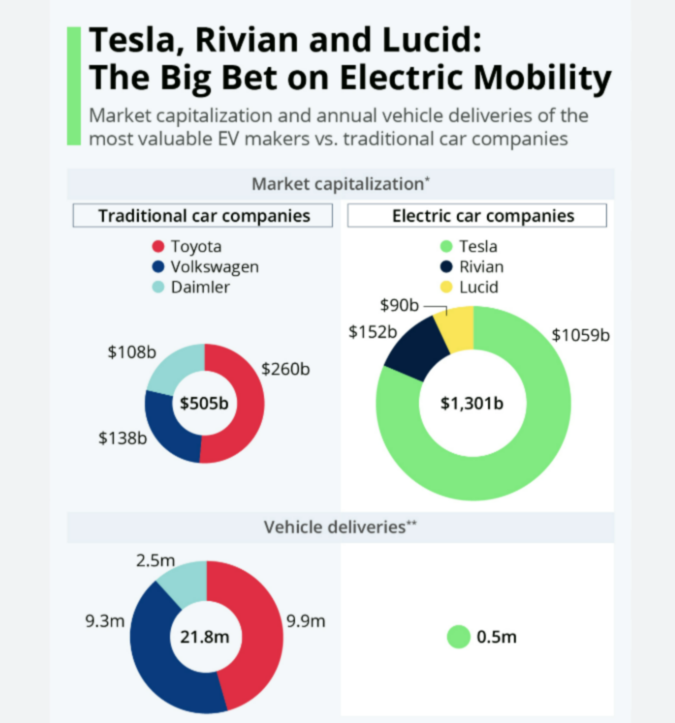Table of Contents
- The EV Market Growth: A Brief Overview
- Tesla: The Reigning EV Giant
- Rivian: The New Contender
- Traditional Automakers Going Electric: Ford and Volkswagen
- Which Brand Reigns Supreme in 2025?
- The Future of EV Cars: What’s Next?
- Conclusion
- FAQs
Introduction
Electric vehicles (EVs) are leading the charge in the automotive industry. As countries push for greener technologies, the EV market continues to grow. But the pressing question for many is: Who is the Ultimate king of EV cars?
In 2025, the title of King of EV Cars is contested by numerous top brands, each striving to dominate the EV market.
With major brands like Tesla, Rivian, Ford, and Volkswagen entering the race, it’s crucial to understand what makes each one stand out. In this post, we will explore the top players in the EV industry, their strengths, and why Tesla is still the dominant force in 2025.
1. The EV Market Growth: A Brief Overview
The electric vehicle market is expected to continue its rapid growth. With advancements in battery technology, charging infrastructure, and government incentives, more consumers are switching to EVs every year. According to Electric Vehicle News, the global EV market is predicted to surpass 30 million units by 2030. This growth is partly driven by the growing demand for sustainable transportation solutions.
What makes these brands the kings of electric vehicles is their commitment to innovation and sustainability.
Key trends driving this shift include:
- Cleaner transportation initiatives worldwide.
- Innovations in battery technology and vehicle charging infrastructure.
- Government policies and subsidies promoting EV adoption.
2. Tesla: The Reigning EV Giant
Tesla remains the undisputed leader in the EV space. Founded by Elon Musk, the company has continually set the bar for both electric car performance and technological innovation.
Tesla electric vehicle – King of EV cars in 2025
Key Factors Contributing to Tesla’s Dominance:
- Battery Efficiency and Range: Tesla’s electric powertrains and battery technology provide unmatched range and charging speed.
- Autopilot Technology: Tesla is a pioneer in self-driving features, making it a standout choice for tech enthusiasts.
- Global Presence: Tesla has a widespread market presence, with a significant share in the US, Europe, and China.
The Tesla Model S, Model 3, Model X, and Model Y are popular worldwide. Tesla’s Gigafactories continue to scale production, ensuring it stays ahead of competitors.
3. Rivian: The New Contender
Rivian has recently emerged as a strong challenger, particularly with its focus on electric trucks and SUVs. The R1T truck and R1S SUV are designed for outdoor adventures, blending sustainability with ruggedness.
Rivian’s Competitive Edge:
- Adventure-Focused Design: The R1T is capable of traversing rough terrains, appealing to off-road enthusiasts.
- Sustainability: Rivian’s production practices focus on minimizing environmental impact.
- Backing from Major Investors: Rivian has received investments from Amazon and Ford, which helps fund its production capabilities.
Rivian has the potential to capture the growing market for electric trucks and SUVs, pushing it into the spotlight.
4. Traditional Automakers Going Electric: Ford and Volkswagen
While Tesla leads the charge, established automakers like Ford and Volkswagen are making strides in electrification. Ford has launched its Mustang Mach-E and F-150 Lightning, while Volkswagen is rolling out its ID.4 SUV.
Ford’s Electrification Efforts:
- Mustang Mach-E: Combines the Mustang’s iconic performance with an electric platform.
- F-150 Lightning: A fully electric version of the best-selling truck in the US, bringing the power and reliability Ford is known for.
Volkswagen’s Vision:
- ID.4 and upcoming ID models are central to Volkswagen’s ambitious plans to become a leader in the electric car market.
Both Ford and Volkswagen are leveraging their existing brand trust and extensive customer base to push into the electric vehicle market, rapidly gaining traction.
5. Which Brand Reigns Supreme in 2025?
Although Tesla is still the king of EV cars in 2025, competition is growing stronger by the day. Rivian’s focus on adventure and off-road vehicles, Ford’s electrification of popular models like the F-150, and Volkswagen’s ID series are all factors that could reshape the EV market in the coming years.
However, Tesla still holds a commanding position in terms of innovation, global presence, and technology. Its supercharger network, cutting-edge features, and consumer loyalty ensure that it remains the leading choice for many EV buyers.
6. The Future of EV Cars: What’s Next?
The future of electric vehicles is exciting. Expect to see:
- Further advancements in battery technology, improving efficiency and reducing costs.
- Widespread adoption of electric trucks and SUVs, opening new markets.
- Enhanced autonomous driving and connectivity features.
As manufacturers continue to develop and introduce new models, King of EV Cars we can expect the competition to intensify. The EV market is evolving rapidly, and the next few years will be pivotal for both emerging and established brands.
Conclusion
While the EV market is competitive, Tesla remains the king of electric vehicles in 2025 due to its technological leadership and market dominance. However, the rise of new entrants like Rivian and the electrification of traditional automakers like Ford and Volkswagen will only make the future of EVs even more exciting.
FAQs
Q: Which is the best EV car for everyday use?
A: The Tesla Model 3 and Ford Mustang Mach-E are both excellent choices, offering range, affordability, and performance.
Q: Will EVs become more affordable in the future?
A: Yes, as battery technology improves and production scales up, the cost of EVs is expected to decrease over time.
Q: What are the biggest challenges facing the EV market?
A: Some challenges include the high cost of batteries, lack of charging infrastructure in certain regions, and the need for more sustainable production practices.

